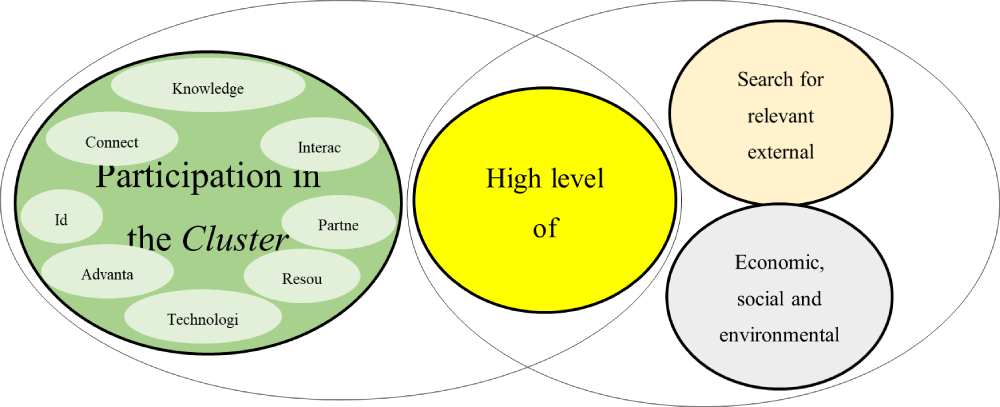Sérgio Begnini, Universidade do Oeste de Santa Catarina, Professor, Chapecó, SC, Brazil.
 Recent studies indicate that firms that adopt sustainability practices can establish differentials from competitors. Lack of knowledge about sustainability issues and trends is a barrier to adopting these practices. For the firm to overcome difficulties, it needs to identify and assimilate external knowledge, relevant to its activities, helping to carry out the necessary internal changes for the adoption of sustainability practices and greater competitiveness.
Recent studies indicate that firms that adopt sustainability practices can establish differentials from competitors. Lack of knowledge about sustainability issues and trends is a barrier to adopting these practices. For the firm to overcome difficulties, it needs to identify and assimilate external knowledge, relevant to its activities, helping to carry out the necessary internal changes for the adoption of sustainability practices and greater competitiveness.
A key point that facilitates the learning process is the firm’s active participation in a cluster. And, the higher the level of participation of the firm in the cluster, the greater the benefits generated for it. The network of relationships established within the cluster can boost recognition and the exchange of information and resources between firms, facilitating the adoption of sustainability practices.
The present study, The Moderating Role of Firm’s Level of Participation in a Cluster in the Relation between Absorptive Capacity and Sustainability Practices, written by Sérgio Begnini, Carlos Eduardo Carvalho and Carlos Ricardo Rossetto, is quantitative, applied and explanatory, reasoned on a vision based on resources and absorptive capacity.
Data were collected through a survey applied to a valid sample of 417 small and medium-sized firms. To test the hypotheses, Structural Equation Modeling was used with the aid of the Analysis of Moment of Structures (AMOS) software. The study was based on what is indicated in the literature about the need to deepen research on the influence of absorptive capacity on sustainability practices and the role of the firm’s level of participation in a cluster.
Integrating a cluster constitutes a differential. Although firms share resources, knowledge and worldviews, participation is heterogeneous, that is, the level of participation in the cluster is different from firm to firm. Firms that have a higher level of participation in the cluster tend to cooperate more, enabling greater access to resources, greater capacity development, as well as an increase in the quality of products and services.

Image: own elaboration
The study, by statistically testing the relationships, confirmed that the higher level of participation in the cluster favors the firm seeking knowledge and adopting sustainability practices. The higher the level of participation in the cluster, the greater the possibility for the company to access information from other firms, and to develop knowledge aimed at generating sustainability practices. For example, a firm that manufactures cold rooms in the food cluster may have developed a useful technology for another company that needs to do thermal insulation, to reduce energy consumption.
It is concluded that: (i) small and medium-sized firms can also develop the absorptive capacity to generate sustainability practices; (ii) it is vital for the firm to seek external information and use it in line with the information and resources it already has to generate economic, social and environmental sustainability practices, which will make it possible to achieve competitive advantage and superior performance; (iii) those firms with a higher level of participation in the cluster are more likely to grow, establish partnerships, carry out innovation and increase productivity.
References
BARBOSA, M., CASTAÑEDA-AYARZA, J.A. and LOMBARDO FERREIRA, D.H. Sustainable Strategic Management (GES): Sustainability in small business. Journal of Cleaner Production [online]. 2020, vol. 258, 120880 [viewed 28 September 2022]. https://doi.org/10.1016/j.jclepro.2020.120880. Available from: https://linkinghub.elsevier.com/retrieve/pii/S0959652620309276
CHANDRASHEKAR, D. and HILLEMANE, B. Absorptive capacity, cluster linkages, and innovation. Journal of Manufacturing Technology Management [online]. 2018, vol. 29, no. 1, pp. 121–148 [viewed 28 September 2022]. https://doi.org/10.1108/JMTM-05-2017-0087. Available from: https://www.emerald.com/insight/content/doi/10.1108/JMTM-05-2017-0087/full/html
LIS, A.M. and ROZKWITALSKA, M. Technological capability dynamics through cluster organizations. Baltic Journal of Management [online]. 2020, vol.15, no. 4, pp. 587-606 [viewed 28 September 2022]. https://doi.org/10.1108/BJM-02-2020-0046. Available from: https://www.emerald.com/insight/content/doi/10.1108/BJM-02-2020-0046/full/html
SARANGO-LALANGUI, P., ÁLVAREZ-GARCÍA, J. and RÍO-RAMA, M. Sustainable Practices in Small and Medium-Sized Enterprises in Ecuador. Sustainability [online]. 2018, vol. 10, no. 6, 2105 [viewed 28 September 2022]. https://doi.org/10.3390/su10062105. Available from: https://www.mdpi.com/2071-1050/10/6/2105
To read the article, access
BEGNINI, S., CARVALHO, C.E. and ROSSETTO, C.R. The Moderating Role of Firm’s Level of Participation in a Cluster in the Relation between Absorptive Capacity and Sustainability Practices. BAR, Braz. Adm. Rev. [online]. 2022, vol. 19, no. 3, e210034 [viewed 28 September 2022]. https://doi.org/10.1590/1807-7692bar2022210034. Available from: https://www.scielo.br/j/bar/a/kLPdrTmB7gbQx5zT8LqgrFm/
External links
Sérgio Begnini: Instagram
Programa de Pós-Graduação em Administração da Universidade do Oeste de Santa Catarina (UNOESC): Instagram | Facebook
Sérgio Begnini – Tese de doutorado em Administração: https://www.unoesc.edu.br/images/uploads/doutorado/Tese_S%c3%a9rgio_Begnini-.pdf
Brazilian Administration Review – BAR: https://www.scielo.br/j/bar/
Como citar este post [ISO 690/2010]:

















Recent Comments